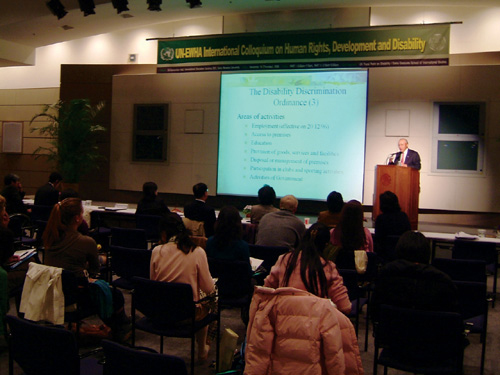
By Min-joo
The UN-Ewha International Colloquium on Human Rights, Development and Disability titled “Policy, Process and Institutions and Future Implementation of the New UN Disability Convention” was held on November 16 in the LG Convention Hall of the International Education Building organized jointly by the Ewha Graduate School of International Studies (GSIS) with the Focal Point on Disability of the United Nations (UN) and the UN Economic and Social Commission of Asia Pacific in cooperation with the UN University and the University of Southern California.
Renowned Korean and international experts in international and national regional policy, and human rights issues from the Governments, the UN system and non-governmental organizations examined emerging issues concerning the implementation of existing human rights conventions. The policy implications for the future implementation of the new UN comprehensive and integral international convention to promote and protect the rights and dignity of persons with disabilities were also discussed.
Following the welcoming and introductory remarks made by Professor Kim Eun-mee, the Dean of GSIS, Professor Akiko Ito from the Focal Point on Disability of UN and Director Kim Kang-rib of Ministry of Health and Welfare gave presentations. A video conference directly linked to the United Nations headquarters was held to discuss international discourses on human rights, development and disability: a “trans-disciplinary approach” and linkages with the mainstream international policy agenda.
The colloquium also went on to explore the newly emerging issues and trends relating to human rights and disability and furthered the discourse on human rights, development and disability, learning from experience in
During the second half of the colloquium, options for collaborations among new and traditional stakeholders and strategies for effective advocacy for the human rights of persons with disabilities were discussed with Kim Gi-youn, who is the Executive Director of the
“It is significant for Ewha to hold this convention because the discussions we had here will be directly submitted and referred to at the United Nations. Ewha is serving as the birthplace for this international convention on the human rights of people with disabilities,” said Professor Kim Eun-mee.

